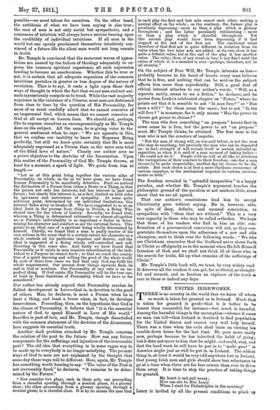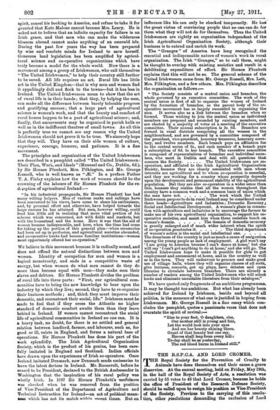THE UNITED IRISHWOMEN.
THERE is no country in the world that we know of where so much is taken for granted as in Ireland. Much that is taken for granted is good—that it is better to be honest than successful, for instance—but much is harmful.
Among the harmful things is the assumption—whence it came no man can tell—that Ireland is destined to find population for the United States and cannot very well help herself. There was a time when the exile shed tears on viewing his
tumble-down home for the last time. He goes more easily now, perhaps because he has inherited the habit of going; but it does not occur to him that he might, and could, stay, and that the hard work he will have to put in to " make good " in America might just as well be put in in Ireland. The oddest thing is, at least it would be very odd anywhere but in Ireland, that young Irish men and girls should show less reluctance to go at a time when there are far less causes than ever to drive
them away. It is time to stop the practice of taking things for granted. My heart is sad and weary ; How can she be Mrs. Leary
When I start for Philadelphia in the morning?
Leary is invited by all the present conditions to pluck up
spirit, cancel his booking to America, and refuse to take it for granted that Kate Malone cannot become Mrs. Leary. He is asked not to believe that an infinite capacity for failure is an Irish grace, and that men who can make the wilderness blossom abroad cannot make anything of an emerald isle. During the past few years the way has been prepared by wise and resolute minds for Ireland to save herself. Generous land legislation has been amplified by agricul- tural science and co-operative organizations which have truly become a model for the whole world. Now there is a movement among a group of Irishwomen, who call themselves " The United Irishwomen," to help their country still further to be saved. All life requires an art. Rural life has little art in the United Kingdom—that is why men and women find it appallingly dull and flock to the towns—but it has less in Ireland. The United Irishwomen mean to show that the art of rural life is in their hands ; that they, by helping the men, can make all the difference between barely tolerable progress and gratifying success ; that a large part of agricultural science is women's work, and that the beauty and comfort of rural homes happen to be a part of agricultural science ; and, finally, that amusements may be organized in parish halls as well as in the indifferent theatres of small towns. As all this is perfectly true we cannot see any reason why the United Irishwomen should not prove it to be true. We sincerely hope that they will. They have on their side women of culture, experience, courage, humour, and patience. It is a fine movement.
The principles and organization of the United Irishwomen are described in a pamphlet called "The United Irishwomen : Their Plan, Work, and Ideals" (Maunsel and Co., Dublin, 6d.), by Sir Horace Plunkett, Mrs. Pilkington, and Mr. George Russell, who is well known as "2E." In a preface Father T. A. Finlay explains how the work of women should be the crowning of the labours of Sir Horace Plunkett for the re- inption of agricultural Ireland:-
" In his industrial propaganda, Sir Horace Plunkett has had many willing helpers. Men of various ranks and callings have been converted to his views, have come to share his enthusiasm, and, by personal effort and otherwise, have helped towards the large success he has attained. But men, however willing, could lend him little aid in realizing that more vital portion of his scheme which was concerned, not with fields and markets, but with the homestead and the home. Here it was that the aid of woman became indispensable, and here, when the time had come for taking up the portion of this general plan—when creameries had been set up in profusion, and agricultural societies abounded, and co-operative banks had become familiar institutions—woman most opportunely offered her co-operation."
We believe in this movement because it is radically sound, and does not offend the natural distinctions between men and women. Identity of occupation for men and women is a logical monstrosity, and ends in a competitive waste of energy, but when women do what men cannot do they do more than become equal with men—they make men their slaves and debtors. Sir Horace Plunkett divides the problem of rural life into three parts : "First, our agricultural com- munities have to bring the new knowledge to bear upon the industry by which they live ; second, they have tp re-organize their business methods ; and, third, they must improve their domestic, and reconstruct their social, life." Irishmen must be made to feel that if they cross the Atlantic no higher standard of domestic comfort awaits them than they leave behind in Ireland. If women cannot reconstruct the social life of agricultural communities in Ireland no one can. It is a heavy task, no doubt, for there is no settled and general
relation between landlord, farmer, and labourer, such as, for good or ill, exists in England, and forms a natural base of
operations. Sir Horace Plunkett has done his part of the work splendidly. The Irish Agricultural Organization Society, which is the product of his genius, has been care- fully imitated in England and Scotland. Indian officials have drawn upon the experiences of Irish co-operators. Once Ireland imitated Denmark, now Denmark sends emissaries to learn the latest devices in Ireland. Mr. Roosevelt, before he ceased to be President, declared to the British Ambassador in Washington that the inspiration of his rural policy was wholly Irish. In 1907 Sir Horace Plunkett's usefulness was checked when he was removed from the position
of Vice-President of the Department of Agriculture and
Technical Instruction for Ireland—an act of political mean- ROSS which has not its match within recent times. But an
influence like his can only be checked temporarily. He has the great virtue of convincing people that no one can do for them what they will not do for themselves. Thus the United Irishwomen are rightly an organization independent of the Irish Agricultural Organization Society, although their business is to extend and enrich its work.
The " Granges " of America have long recognized the essential and indispensable nature of women's work in rural organization. The Irish " Granges," so to call them, might be thought to overlap with existing societies and result in a; debilitating expenditure of effort. Sir Horace Plunkett explains that this will not be so. The general scheme of the United Irishwomen came from Mr. George Russell, Mrs. Lett, Mrs. Pilkington, and a few others. Mrs. Pilkington describes the organization as follows:- " The Society consists of a central union and branches, the whole governed by an executive committee. The work of the central union is first of all to organize the women of Ireland by the formation of branches, as the parent body of the co- operative movement has so largely succeeded in organizing the men. It serves also as a link between the branches when so formed. Those wishing to join the central union as individual members are proposed and seconded by existing members, and are elected by a majority of votes at a meeting of the executive committee. Their annual subscription is 2s. 6d. Branches are formed in rural districts comprising all the women in the neighbourhood, and are governed by a committee composed of the president, vice-president, honorary treasurer, honorary secre- tary, and twelve members. Each branch pays an affiliation fee to the central union of 5s., and each member of a branch pays a subscription of 6d. to her branch. The executive committee is composed of representatives of branches and individual mem- bers, who meet in Dublin and deal with all questions that concern the Society. The United Irishwomen are co. operators, and affiliated to the Irish Agricultural Organization Society, because they are closely associated with men whose interests are agricultural and to whom co-operation is essential, and they are working for a country whose prosperity depends upon the development and permanent stability of the agricultural population. But they are also co-operators in a wider sense than this, because they realize that all the women throughout the country have a common work and a common basis of union which
the men have not The work which the United Irishwomen propose to do in rural Ireland may be considered under three heads—Agriculture and Industries ; Domestic Economy ; Social and Intellectual Development. A woman's place in connec- tion with agriculture and industries is to encourage the farmer to make use of his own agricultural organization, to support his co- operative societies, and assist him when these societies touch on woman's domain The domain of domestic economy is greatly enlarged and of much wider interest when the spirit
of co-operation penetrates it The third department of women's action is the social and intellectual one. . . . . . The dreariness of the country is just as much a cause of emigration among the young people as lack of employment. A girl won't say ' I am going to America because I can't dance at home,' but she will say I can't get anything to do at home,' and she will go. The United Irishwomen hope to make it possible for girls to get employment and amusement at home, and in the country as well as in the town. They will endeavour to procure and make good use of village halls, where they will organize classes of all sorts, give lectures, concerts, get up plays, have debates and open libraries to circulate between branches. There are already a number of readers among the United Irishwomen who will select books and eliminate unsuitable literature from their catalogue."
We have quoted only fragments of an ambitious programme. It may be thought too ambitious. But what has already been achieved for Ireland by Irishmen, beside and beyond all politics, is the measure of what one is justified in hoping from Irishwomen. Mr. George Russell in a fine essay which con- eludes the pamphlet, quotes a passionate verse that does not overstate the spirit of revival:—
"Rise to your feet, 0 daughters, rise, Our mother still is young and fair,
Let the world look into your eyes And see her beauty shining there.
Grant of that beauty but one ray, Heroes shall leap from every hill z
To-day shall be as yesterday,
The red blood burns in Ireland still."











































 Previous page
Previous page